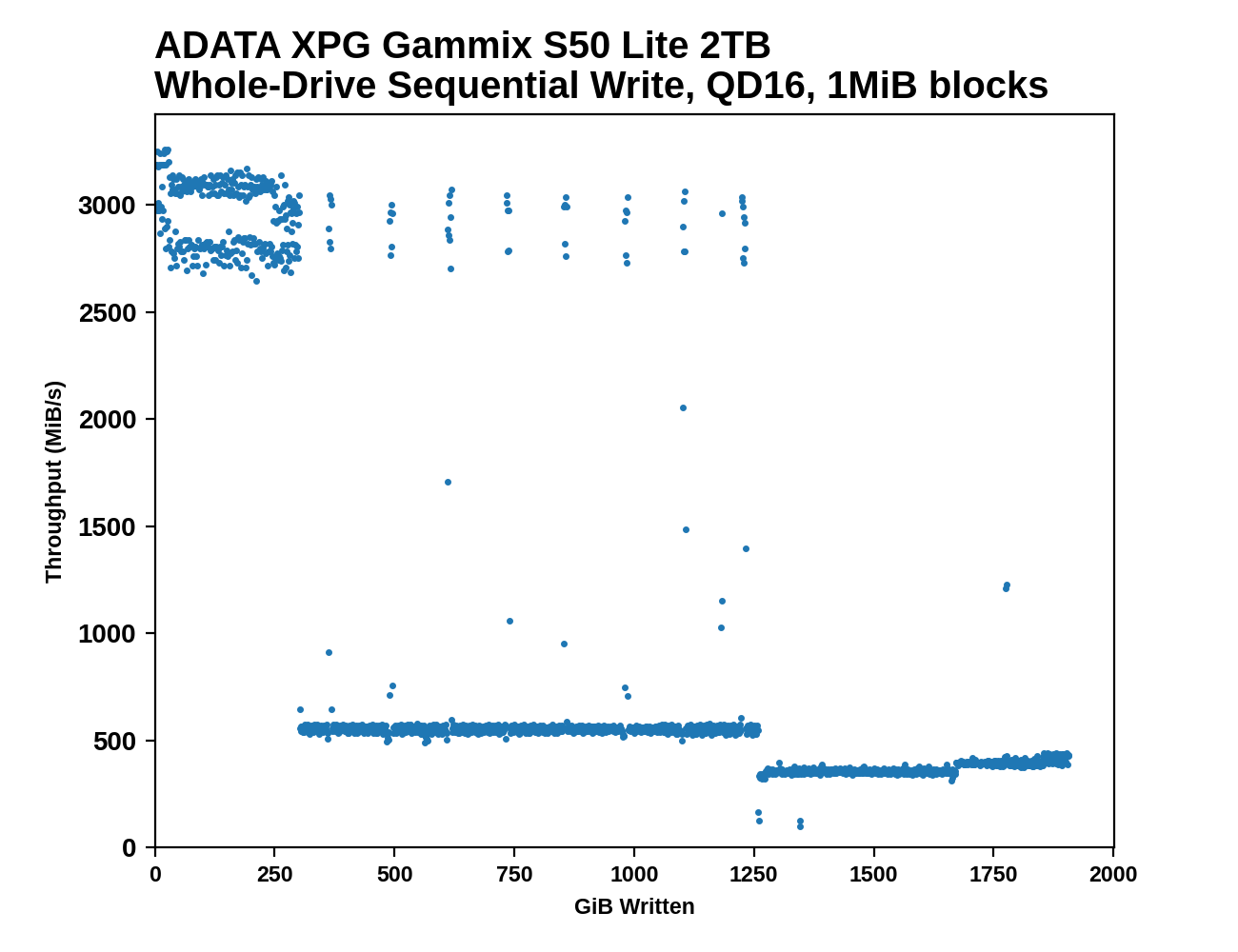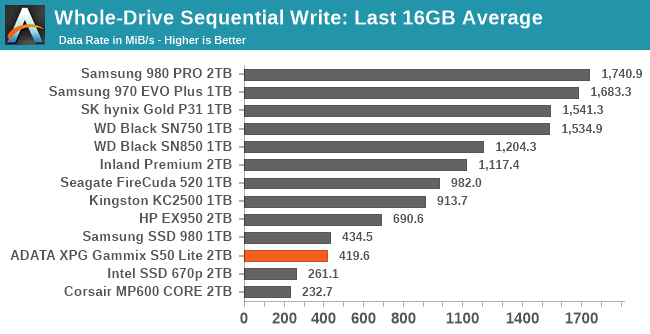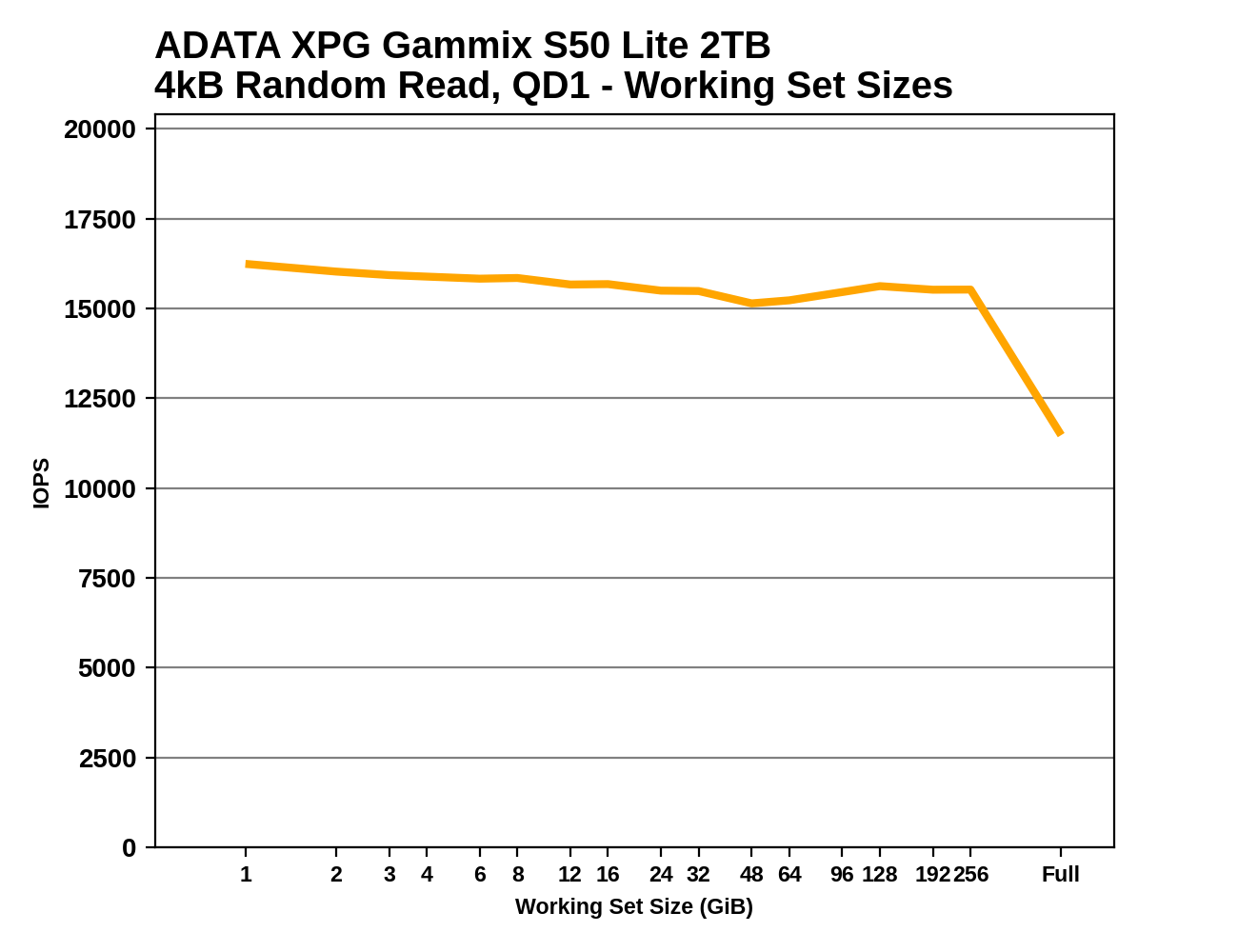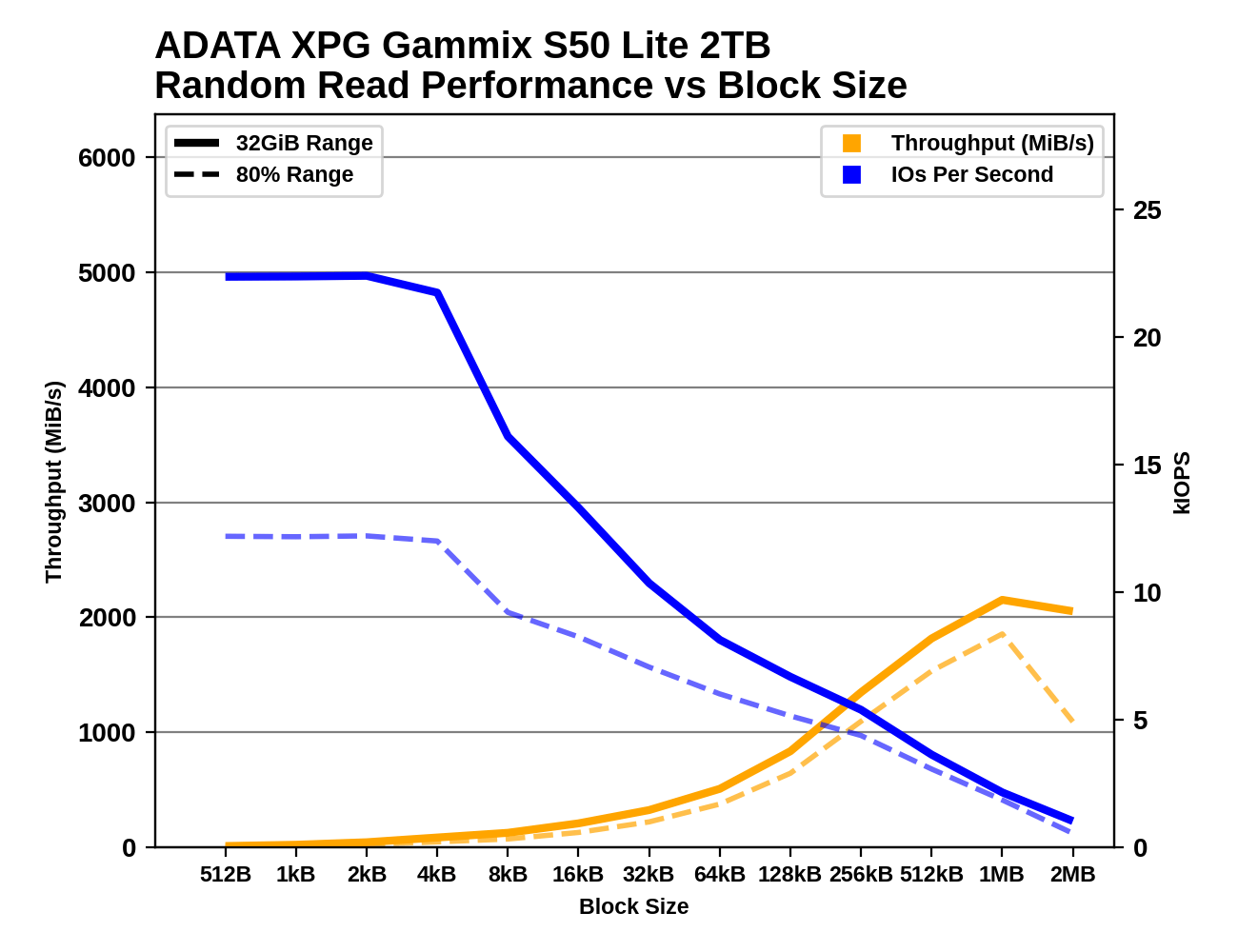The ADATA GAMMIX S50 Lite 2TB SSD Review: Mainstream PCIe Gen4
by Billy Tallis on April 30, 2021 8:00 AM ESTAdvanced Synthetic Tests
Our benchmark suite includes a variety of tests that are less about replicating any real-world IO patterns, and more about exposing the inner workings of a drive with narrowly-focused tests. Many of these tests will show exaggerated differences between drives, and for the most part that should not be taken as a sign that one drive will be drastically faster for real-world usage. These tests are about satisfying curiosity, and are not good measures of overall drive performance. For more details, please see the overview of our 2021 Consumer SSD Benchmark Suite.
Whole-Drive Fill
 |
|||||||||
| Pass 1 | |||||||||
| Pass 2 | |||||||||
The ADATA XPG Gammix S50 Lite shows an almost QLC-like performance drop when the SLC cache runs out after about 300GB: it falls down to SATA speeds. But even though its post-cache write speed is half of what we're used to seeing from TLC drives (most of which use controllers with 8 channels rather than 4), the S50 Lite still has a big lead over the two QLC drives in this bunch.
On the second pass of filling the drive, the S50 Lite's SLC cache is good for only about 14GB and the post-cache performance is much less consistent, with frequent drops below 100MB/s and spikes back up to SLC speeds around 3GB/s.
 |
|||||||||
| Average Throughput for last 16 GB | Overall Average Throughput | ||||||||
Working Set Size
 |
|||||||||
The S50 Lite has excellent random read latency for smaller working sets, beating all but two of the drives in this bunch. But the consequences of having only 1GB of DRAM for a 2TB drive show up at the end of the test, where the random read performance falls off sharply once the reads span the entire drive rather than just a small slice.
Performance vs Block Size
 |
|||||||||
| Random Read | |||||||||
| Random Write | |||||||||
| Sequential Read | |||||||||
| Sequential Write | |||||||||
The S50 Lite offers the same random read IOPS for all the IO block sizes from 512 bytes up to 4kB, but when testing random writes there's a clear preference for 4kB block sizes rather than anything smaller. Rather surprisingly, sequential reads with 4kB block sizes are far slower than for slightly smaller or larger block sizes; it would appear that the drive assumes 4kB reads will be random IO, and skips whatever caching or prefetching is active when using other block sizes.










93 Comments
View All Comments
Qasar - Monday, May 3, 2021 - link
" Not a fan of freedom of speech/expression/press? " that what it is, its just his bias opinion, for some reason, he hates QLC, and seems to go to great lengths to say how bad it is.Linustechtips12#6900xt - Monday, May 3, 2021 - link
I love seeing the fights in the comment sections, honestly makes my day lolFunBunny2 - Monday, May 3, 2021 - link
" " Not a fan of freedom of speech/expression/press? " "a frequent complaint, esp. the Lunatic Right. the text of the US Constitution *only* promises that the Damn Gummint cannot, arbitrarily, shut you up. they can if your calling for insurrection, for instance. and it says nothing about what a private entity can do. you remember seeing signs on retail doorways - 'no solicitation allowed'? that means union organizers can't say what they want on or near the premises. it also means that Big Bad Tech can monitor and quash speech/text they find objectionable; no reason need be given. the list goes on forever.
GeoffreyA - Tuesday, May 4, 2021 - link
Qasar, I think he's making a valid complaint, and fears, like many of us do, that Q will become the standard soon and T the costlier "pro" variant. QLC began with a dubious reputation and so we're resistant to its replacing something we trust. For one thing to replace something else, it must be better, not equal or weaker. Q's argument is better size and price; but, as it stands, doesn't seem to be delivering much in those areas, yet wants to usurp the throne from TLC.Oxford Guy - Tuesday, May 4, 2021 - link
'Qasar, I think he's making a valid complaint, and fears, like many of us do, that Q will become the standard soon'Just wait for PLC. It's coming, apparently.
romrunning - Tuesday, May 4, 2021 - link
I'm inclined to agree also. I've seen the transition from SLC to MLC to TLC, and I have no doubt that soon QLC will replace even TLC (at least for consumers). TLC wasn't too far a drop-off performance-wise from MLC, but QLC is quite a bit less.I don't doubt that most consumers won't be able to see the difference, but I'm disappointed that we're going down the spec-tree instead of up (a lower baseline now), primarily because the mfgs want to save money.
Oxford Guy - Tuesday, May 4, 2021 - link
It's amusing to see how, despite the many comments condemning QLC from other posters on this site in very recent articles, I am suddenly being singled out.Ad hominem won't change the facts:
Every dollar spent on QLC is a dollar that reduces TLC production, raising TLC prices by increasing TLC scarcity. The same thing happened with MLC.
QLC has double the voltage states for only 30% more density. That's diminished returns.
TLC was made much more viable via the change from planar to 3D production. Remember how the Samsung 840 (planar TLC) was so unstable from voltage drift that the only solution was a kludge: re-writing the data again and again? That very serious symptom of a very troubling problem (due to the increase in voltage states in going from MLC to TLC) was solved via the introduction of 3D lithography. Where is the silver bullet for QLC? It has been produced in 3D from the beginning and yet its flaws are still quite evident.
Samus - Wednesday, May 5, 2021 - link
I'm kinda with Banshee here, spreading nonsense like this is not just ignorant and counterintuitive, but dangerous. People stupid opinions can be protected by free speech but outright lies shouldn't be.GeoffreyA - Wednesday, May 5, 2021 - link
"protected by free speech but outright lies shouldn't"Like any principle taken too far, free speech can certainly be abused, and sow lies, discord, or hatred. That's why it's got to be bound by other rules.
Oxford Guy - Thursday, May 6, 2021 - link
Free speech is a myth. All speech is subjected to censorship, including by the mind of the person producing it. The key here is that echo chambers (which aren't difficult to find on tech websites like Ars and Slashdot) are not the only solution to having community feedback.